The transphobic murder that has shocked Colombia
The crime occurred in broad daylight and has terrified the LGBTQ+community living in Bello, Antioquia, particularly trans women. The family demands justice and asks that the victim, Sara Millerey, be remembered for her values and beauty, and not for the viral video of the brutal assault that led to her death
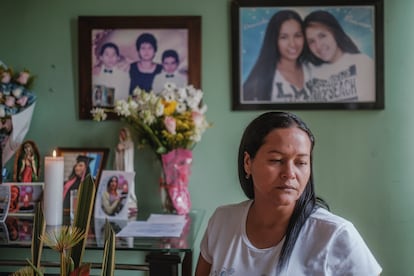

Sara Millerey wanted to be remembered as a beautiful trans woman. When she was going to sleep, she told her mother that it was time for her beauty sleep. She started her gender transition at 15 and chose Millerey as a name because she loved the mirellas: the glitter that would sparkle around her eyes and in her hair.
One of Sara’s friends recalls how she met her in the streets of Bello, a town near Medellin, dancing to Britney Spears. Sandra Borja, Sara’s mother, would like to remember her only daughter as Bello’s most beautiful girl who adored her mother. If she could, she would erase the images of her 32-year-old daughter in a 28-second video in which she appears flailing and gasping for breath in a dirty creek, unable to swim due to her fractured legs, arms and hands. “Those images are going to stay with me for the rest of my life,” Sandra says through tears. “They killed for her being who she was.”
Colombia has been shocked by the cruelty shown in that video that went viral on April 5. President Gustavo Petro has asked the authorities to urgently investigate the case, and events have been held in several cities to denounce transphobia. In the first quarter of this year, hate has killed 13 trans people. Sebas Zitrus, who identifies as a non-binary person and is co-director of the city council for the LGBTQ+ population in Bello, says that Sara’s is the third murder this year against LGBTQ+ individuals in the town; the first two victims were gay men. “There was tremendous cruelty in Sara’s case,” he says. “The population is hurt and outraged. We have mobilized in the country, but there is still a lot of fear. Our families are asking us: What if the next one was you?”
The mother
Sandra, 47, says it was almost three o’clock in the afternoon on Friday, April 4, when one of her sisters called to tell her that Sara was drowning. She ran to the Playa Rica neighborhood, where a creek runs between poor brick houses. In the windows, and on a small bridge, there was a “horde of people” filming her drowning daughter on their phones. “My first reaction was to throw myself into the river,” she recalls. The crowd prevented her from doing so, because the current was strong; instead, two neighbors jumped in. “I shouted to her: ‘Sweetheart, sweetheart, hold tight, hold on to that branch!’ She remembers Sara looking into her eyes. Eventually, she was pulled from the creek but by then she had developed hypothermia. The firefighters tried to stabilize her, and an ambulance took her to a clinic in the center of Bello. Sandra and Sara’s aunt say that in the clinic she was not treated as an emergency. “They said it was because she didn’t get shot. But, by God, all the parts of her body were broken,” says Sara’s aunt.
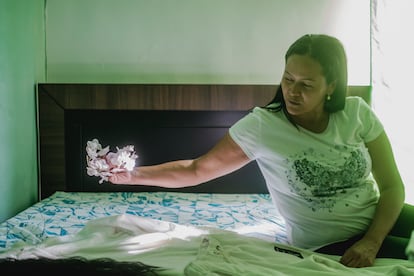
Sandra asked her daughter who threw her into the creek, but Sara just looked at her and said “Mom, give me water, Mom, I’m very thirsty.” But she wasn’t allowed to drink due to the tests. “Mom, I’m going to die,” Sara said. Sandra tried to reassure her but one of Sara’s lungs was punctured and Sara had a cardiac arrest early the next morning. A second cardiac arrest killed her at three that afternoon. Her mother was the last person to see her.
“I knelt down and hugged her and told her that I loved her very much. I told her she was going to be with God, because no one in heaven was going to humiliate or discriminate against her for being her.” Sandra says that her daughter asked to be dressed in white if she died. So Sandra went out to buy a new white sweatshirt, pearl earrings and a crown of pink leaves. But her daughter’s body was so mutilated that the funeral services said a closed coffin would be better. No one could see Sara as she had wanted, in white, at her wake.
Dozens of locals came to the funeral mass on April 8. “We want to ask for justice to be done. This cannot be ignored. Today it was her, tomorrow it could be anyone,” said one of Sara’s uncles. City Hall officials were criticized for using the name Sara had before she transitioned in their communications. But at least the priest who led the mass called her Sara. She felt like a woman, he said, “like any other woman. What harm did she do? Many people here live like this, feeling scared, because there is a lot of homophobia.” Sandra says that her heart ached as the priest spoke
The friend
Ginna, a 38-year-old trans woman, who prefers to use a pseudonym, says Sara’s murder has filled her with panic. When an acquaintance sent her the video, she says she went into shock and cried for hours. She’s lost her appetite and is taking sleeping pills and doesn’t want to go out. She and Sara were close; they shared heartbreaks, parties and advice. Ginna watched the video several times: “I know it sounds strange, but if the video hadn’t gone viral, people wouldn’t have known what is really happening to us: things like this happen all the time.” She has another video of Sara on her cell phone, one of her friend singing and dancing to a song by Amanda Miguel: “I don’t want flowers when I die, I want them now in my garden.” That’s how Ginna prefers to remember her friend.

Ginna does not rule out that some type of “social cleansing” is behind Sara’s murder. In Colombia’s ongoing low-intensity war, there have been instances in which armed groups have targeted LGBTQ+ communities. And in Playa Rica, there are many combos, as the gangs are known. Ginna is a sex worker, as was Sara. She says that her friend started sex work at 17 to pay for a drug habit. She says she doesn’t know if she was killed for being trans, for her profession or for her addiction.
“Something strange is happening. Now I’m afraid to meet my clients,” says Ginna. “After what happened to Sara, more than 30 men have written to me on WhatsApp asking me for my services, and it seems suspicious to me, because there’s not much work around. I’m a very visible trans, and now I’m one of the ones that has to take most care.” She says that she has not received threats, but other colleagues have, via WhatsApp and social media: They tell them “Watch out you little bitches, you saw what happened to the other bitch and the same thing is going to happen to all of you.” Ginna prefers to work virtually: if the killers were out to scare her, they have succeeded.
Ginna feels there is something strange about the murder of her friend: it was in broad daylight, when usually the murdered trans women “are set traps that take them to remote places” or bundled into cars. Two years ago, several gay men were lured to hotel rooms through the Grindr app and killed. Ginna remembers that Luna, a rough-sleeper friend of Sara’s, was stabbed to death one night in the street while she was sleeping. Something similar happened with La Juana and La Tita, murdered in their homes. La Javi was killed in a hairdresser. Eight years ago, it was Susana Fonnegra, murdered in a park at dawn. There are multiple cases that have gone unpunished. “Sara was not only murdered, but they wanted to show everyone what they did. They wanted to make sure everyone saw the cruelty,” says Ginna.
Another thing that strikes Ginna is that several Playa Rica locals actually witnessed the brutal assault on Sara. “I know that many people tried to help Sara when she was getting beaten and the neighbors were screaming for it to stop. But the men doing it replied that whoever got involved would also be beaten up. They took her to the ravine. She wanted to run but they were behind her, hitting her. Then they threw her into the water.” The police have been interrogating local residents, as EL PAÍS was able to confirm, but no one has been arrested. Although the authorities have offered a reward of 100 million pesos –about $23,000 – for information, Ginna suspects locals are unlikely to talk for fear of reprisals.
The author
Sara Millerey wrote a diary that filled several notebooks. She titled it Mi Autoría and shared it with her mother who would like to see it published. In it, Sara writes that her father mistreated her mother. She also says, “He didn’t love me. I was too feminine and my tastes made me like a little girl and not a little boy.” She adds that her mother left her father and took care of her with the help of one of her grandmothers. As a teenager, Sara was clear that she felt like a woman and would sometimes participate in a beauty contest, organized by her friends – “the faggots” – and be crowned the most beautiful.
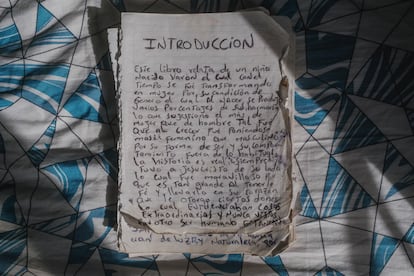
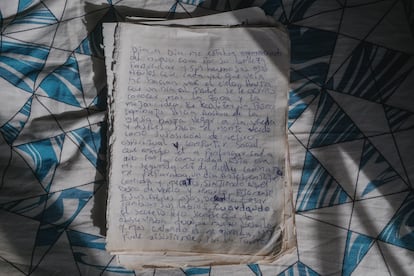
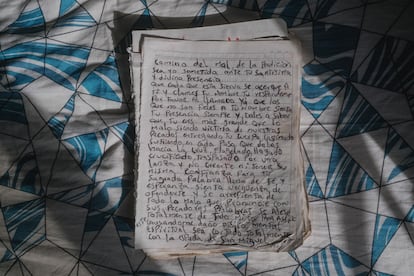
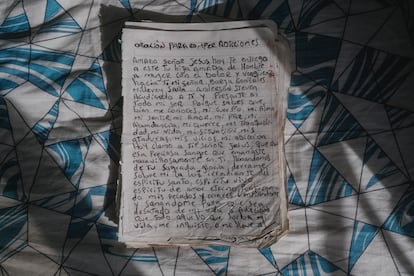
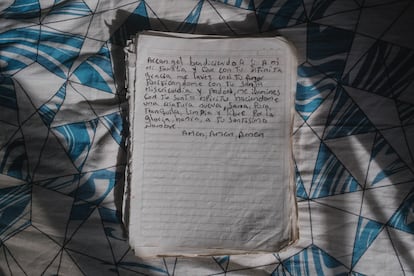
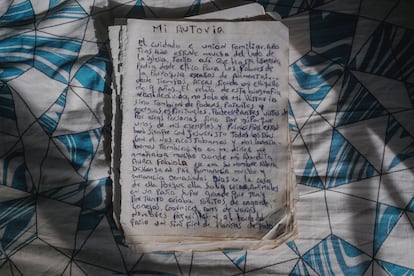
Sara was very religious. In her notebooks, she says that her principles “were always guided by Jesus Christ,” and that the first time she fell in love was with a priest. After she told the priest of her feelings, she was thrown out of the Church. “They excommunicated me, and they no longer allowed me to participate in mass,” she wrote.
She explains how she distanced herself then from the Catholic Church, but not from her faith in Christ: “I was content to always feel his presence.” Sara kept a notebook with “prayers, rituals and spells,” in which she invented a prayer for several saints and for her pet dog Nicolás, praying “that they never mistreat him, much less beat him… I, Sara Millerey González Borja, affirm that I love and accept him as another member of my family.” Another of her prayers is entitled Prayer to break addictions. In it, she tells Jesus that he knows her, with “my vices, my addiction,” and asks him to free her from “that thing which disrupts my life.” About five years ago, Ginna says that Sara fell in love and cut back on her drug use. She started selling sweets and decided to go back to high school, graduating in 2019. Sandra told her daughter to study hairdressing as she was so interested in beauty.
Death is very present in Sara’s writings. On one page, she thanks “the Lord for giving me one more year of life.” She also writes that she is being stalked and feels scared. She prays that nothing will happen to her: “I am greatly concerned something bad will happen to me,” she writes, and “that those who wish for my death may be disappointed and humiliated.” She also asks for courage to face “the many earthly dangers that surround me.” She does not say who is threatening her, nor are there dates to indicate when she wrote each entry. What is clear is that she constantly feared for her life. “Remove all evil, all bad attitude and all bad action, all ideas against me, especially the act of violence that harms me or leaves me lifeless,” she writes. “If that ever happens, guide me with your precious light.” One of her prayers ends with a kiss painted in pink lipstick, and another with an “Amen, amen, amen.”
Sign up for our weekly newsletter to get more English-language news coverage from EL PAÍS USA Edition
Tu suscripción se está usando en otro dispositivo
¿Quieres añadir otro usuario a tu suscripción?
Si continúas leyendo en este dispositivo, no se podrá leer en el otro.
FlechaTu suscripción se está usando en otro dispositivo y solo puedes acceder a EL PAÍS desde un dispositivo a la vez.
Si quieres compartir tu cuenta, cambia tu suscripción a la modalidad Premium, así podrás añadir otro usuario. Cada uno accederá con su propia cuenta de email, lo que os permitirá personalizar vuestra experiencia en EL PAÍS.
¿Tienes una suscripción de empresa? Accede aquí para contratar más cuentas.
En el caso de no saber quién está usando tu cuenta, te recomendamos cambiar tu contraseña aquí.
Si decides continuar compartiendo tu cuenta, este mensaje se mostrará en tu dispositivo y en el de la otra persona que está usando tu cuenta de forma indefinida, afectando a tu experiencia de lectura. Puedes consultar aquí los términos y condiciones de la suscripción digital.








































